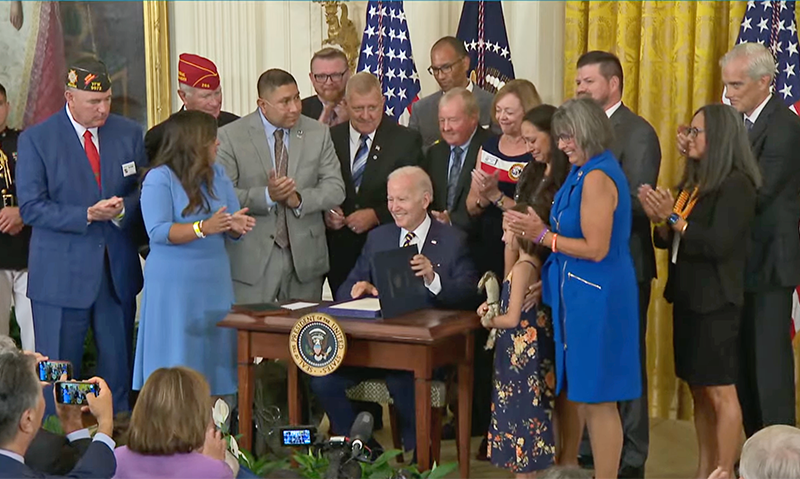
Caring for veterans is the nation’s most sacred obligation, the president said.
President Biden ushered in sweeping changes for millions of veterans exposed to toxic fumes by signing the PACT Act in a ceremony at the White House on Aug. 10.
The bipartisan legislation — Sergeant First Class Heath Robinson Honoring Our Promise to Address Comprehensive Toxics (PACT) Act of 2022 — is named in honor of an Army National Guard veteran. After deploying to Kosovo and Iraq as a combat medic with the Ohio National Guard, Robinson was diagnosed with a rare autoimmune disorder and stage 4 lung cancer. He died in May 2020. His widow, Danielle, and their young daughter, Brielle, stood next to the president when he signed the bill into law.
The legislation was spearheaded by Sens. Jon Tester, D-Mont., and Jerry Moran, R-Kan., and championed by The American Legion. The legislation will impact generations of veterans by expanding Department of Veterans Affairs (VA) benefits and care for veterans exposed to burn pits and other toxic substances. The PACT Act is the most significant expansion of VA health-care benefits and services in more than 30 years and could impact as many as five million veterans. (What you need to know about the PACT Act.)
“We can never fully thank you for your service and your sacrifice,” the president said. “Less than 1% of you risk everything to defend 99% of the population.
“As a nation we have many obligations … and only one truly sacred obligation: to equip those we send into harm’s way and to care for them and their families when they come home.”
We are one step closer to fulfilling this obligation, Biden said.
“This is the most significant law our nation has ever passed,” he said.
When some of the nation’s strongest warriors came home from Iraq and Afghanistan, they weren’t the same, Biden said, adding, “my son was one of them.”
Beau Biden was a major in the Delaware Army National Guard’s Judge Advocate General Corps. He was diagnosed with brain cancer after deployments to Iraq and Kosovo, where the president said he lived in the vicinity of burn pits. He died in 2015 at the age of 46 after a battle with brain cancer.
“To us and to many of you in this room, it’s personal,” he said. “The PACT Act is the least we can do for the men and women who suffered from toxic exposures while serving their country.”
VA Secretary Denis McDonough called the signing of the PACT Act a “monumental moment.”
“It’s our job as a nation to provide toxic-exposed veterans and their survivors with the care and benefits they deserve,” McDonough said. “For too long that did not happen. For too long, too many veterans who got sick while fighting for our country had to fight for their care here at home.
“President Biden has made it clear those days are over. By signing the PACT Act into law, President Biden will empower VA to deliver care that millions of toxic-exposed veterans need and the benefits they and their loved ones deserve.”
American Legion National Commander Paul E. Dillard was on hand for the signing and thanked the president for signing the legislation.
“Millions of veterans and their families can take comfort in knowing that their government truly appreciates their service and sacrifice,” he said. “This comprehensive health-care law is the result of hard work and bipartisanship by patriotic advocates, members of Congress and American Legion Family members worldwide.”
Dillard also noted that American Legion service officers are available free of charge to assist veterans in navigating the VA claims process.
“I encourage all veterans who have been exposed to toxic substances while serving in the military to contact their American Legion service officers for free assistance in accessing the benefits that they have earned,” he said. “The claims process can be complicated, and American Legion service officers are happy to help.”
To learn more about the PACT Act, visit VA.gov/PACT or call 1-800-MY-VA-411.
- Veterans Benefits

